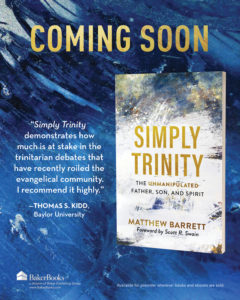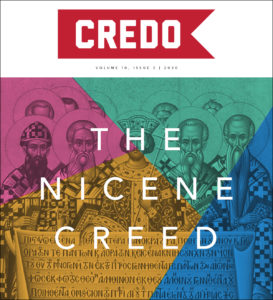The Nicene Creed is rightly famous for its strong affirmation of the deity of Jesus Christ, the Son of God. This is most clear in its assertion that the Son is “of one substance with the Father.” But what is perhaps less well known is that the Nicene Creed not only affirms his deity but the way in which he possesses that deity. The Creed affirms that the Son possesses deity by being eternally “begotten” of the Father. Because he is eternally begotten of the Father, he possesses the same divine essence as the Father.
This teaching that the Son is eternally begotten is also known as the doctrine of the eternal generation of the Son—“generation” simply being the Latin word for “begetting.” According to the Nicene Creed, there are three elements of this doctrine of the eternal generation of the Son. The Father’s begetting of the Son: (1) is eternal; (2) is distinct from creating; and (3) puts the Son in possession of the full divine nature.
This Begetting is Eternal
The first thing the Creed teaches us about the eternal generation or begetting of the Son is that it is an eternal divine act. The Creed affirms this when it says the Son is “begotten of the Father before all worlds.” The Greek word here translated “worlds” is aiones, which can also be rendered “ages.” The word aiones refers to the cosmos viewed in terms of its extension through time rather than space. By saying that the Son is begotten “before all worlds/ages,” the Creed is teaching that the Father’s begetting of the Son is prior to creation and has no beginning or end. An even better way of putting it is to say that it does not occur within time but transcends time. Because the Son is eternally begotten of the Father, he possesses the same divine essence as the Father. Click To Tweet
The eternal generation of the Son is categorically different from human generation at this point. When a human father begets a human son, the begetting takes place within the created realm that is bound by the limitations of time. A human father temporally precedes his son in existence. There is a time when a human father exists but his son does not yet exist. Human begetting is a time-bound process, but the Father’s begetting of the Son transcends time. “Begotten of the Father before all ages” helpfully distinguishes the divine begetting (outside of time) from human begetting (within time).
One of the key texts that the church fathers appealed to in support of this doctrine is Proverbs 8:22-31. In this passage a mysterious figure named “Wisdom” speaks, saying that she was begotten of God before creation (“before the hills, I was brought forth”) and was beside God like a master workman when God created all things. The New Testament reflects on this passage on several occasions and identifies the mysterious figure of Wisdom with the Son (Matt. 11:19; 1 Cor. 1:24, 30; Col. 2:3). For this reason, the church fathers understood Proverbs 8:22-31 as the words of the second person of the Trinity personified as lady Wisdom. The Nicene Creed’s affirmation that the Son was “begotten of the Father before all worlds” is merely a restatement of the clear teaching of Proverbs 8:22-31, which, in light of the New Testament commentary, is referring to the Son.
But what about Psalm 2:7 (“You are my Son; today I have begotten you”)? This verse seems to say the Father begat the Son within time. In its original setting in the life of Israel, Psalm 2 was probably used at the coronation of a new king, whether David himself or one of his descendants. Against the raging of the nations and their futile plots to resist God’s kingdom, the psalm relates the words of the Lord, “I have set my King on Zion, my holy hill” (Ps. 2:6). In the original setting, this was no doubt a human king, a human offspring of David. Yet in the New Testament perspective, the Lord’s anointed King who has been set on Zion’s hill is ultimately none other than Christ, and the time when he was set there was his ascension into heaven. As with Proverbs 8:22-31, the New Testament provides us with inspired commentary to guide our interpretation, quoting or alluding to Psalm 2:7 multiple times and applying it to Christ. But even if we agree that Psalm 2:7 is about Christ, doesn’t the “today” dictate that he was begotten in time? The Nicene Creed’s affirmation that the Son was “begotten of the Father before all worlds” is merely a restatement of the clear teaching of Proverbs 8:22-31, which, in light of the New Testament commentary, is referring to the Son. Click To Tweet
The quotation of Psalm 2:7 in Acts 13:33 seems to take the “today” as the day of his resurrection. In response, we must note that by his resurrection he was declared to be the Son of God in power (Rom. 1:3-4), but it cannot be when he was begotten as the Son of God, since there are other New Testament passages which apply Ps. 2:7 to events prior to his resurrection, namely, his baptism (Mark 1:11; Luke 3:22) and transfiguration (Matt. 17:5; Mark 9:7; Luke 9:35; 2 Pet. 1:17). But even the baptism and the transfiguration cannot be when he was begotten, for the author of Hebrews pushes Psalm 2:7 back even farther to the time before the incarnation, when the Father “brings the firstborn into the world” (Heb. 1:5-6), prior to “the days of his flesh” (Heb. 5:5-7). Indeed, Hebrews boldly proclaims right at the outset that he was the Son before creation (Heb. 1:2) and calls him “the Same yesterday and today and forever” (Heb. 1:12; 13:8). Thus, the New Testament ultimately takes the “today” of Psalm 2:7 as the “day” of eternity. The various points in the earthly life of the incarnate Son—his baptism, transfiguration, resurrection, and exaltation—are moments when the incarnate Son was publicly declared to be what he already was before his incarnation. 
Begotten, not Made
Second, according to the Nicene Creed, eternal generation means the Son is the offspring of the Father and therefore internal to the Father’s nature, not something made, which would make him external to God. The Creed teaches this in the terse but crucial words, “begotten, not made.” If the Father’s act of begetting the Son was an act of creating or making the Son out of nothing, then the Son would fall on the creature side of the Creator-creature distinction. The Arians taught exactly this. They taught that the Son was the very first creature that God made. To be sure, he is the most glorious creature, greater even than all the angels, and can even be called a “god” due to his majesty and divine qualities. But in the final analysis, for the Arians, he is still a creature. “There was a time when he was not,” the Arians said. He began to exist, or sprang into existence out of nothing, when the Father made him. The Creed rejects this Arian conception of the Son’s origin and affirms boldly that he is “begotten, not made.” If the Son is God’s “only begotten” Son, and if all things were “made” through him, then we may rightly say he is 'begotten, not made.' This crucial anti-Arian phrase in the Nicene Creed is no philosophical speculation but the plain… Click To Tweet
That he is “begotten, not made” is implied by the five New Testament texts which teach that God created all things through the Son (Jn. 1:3, 10; 1 Cor. 8:6; Col. 1:16; Heb. 1:3). Of these texts, John 1:1-3 is the most emphatic. John writes, “In the beginning was the Word, and the Word was with God, and the Word was God” (Jn. 1:1). To make clear that he is not a created deity, he adds, “He was in the beginning with God. All things were made through him, and without him was not anything made that was made” (Jn. 1:2-3). The double use of the phrase “in the beginning,” quoting Genesis 1:1, suggest that the Word was “with God” at the alpha point when there was not yet any created thing. Indeed, all created things came into existence through him. If he were a created sub-deity, he would be one of the things that came into being. By affirming that “without him was not anything made that was made,” John places the Word on the Creator side of the Creator-creature distinction and categorically distinguishes him from all created things. He is eternally begotten, not made.
It is instructive to compare the opening verses of John’s prologue (“all things were made through him,” Jn. 1:3) with the closing verses of the prologue (“glory as of the only begotten from the Father … the only begotten God,” Jn. 1:14, 18). If he is God’s “only begotten”[1] Son, and if all things were “made” through him, then we may rightly say he is “begotten, not made.” This crucial anti-Arian phrase in the Nicene Creed is no philosophical speculation but the plain teaching of Scripture.
Full Divine Nature
Third, the Creed informs us that eternal generation puts the Son in possession of the full divine nature. The Creed makes a special point of emphasizing this when it affirms that the Son is “God of God, Light of Light, very God of very God.”
The phrase “very God of very God” can also be translated “true God of true God.” The fact that the Son derives his deity from the Father in an act of supratemporal generation that is distinct from the act of creating or making, implies that the Son is all that the Father is as to essence. If the Father is “true God,” then the Son, who is of the Father, is also “true God.” The Son is not a sub-deity or a creature with impressive divine qualities, as the Arians taught. The fact that the Son is begotten of God, means that he has the same nature as God. He is equal with the Father in his being, attributes, power, glory, and worship.
John concludes his First Epistle with precisely this affirmation: “And we know that the Son of God has come and has given us understanding, so that we may know him who is true; and we are in him who is true, in his Son Jesus Christ. He is the true God and eternal life” (1 Jn. 5:20). Here we have the basis of the Nicene Creed’s affirmation that Jesus the Son of God is “true God.” But he is not only “true God.” He is “true God of true God.” Jesus himself said, “As the Father has life in himself, so he has granted the Son also to have life in himself” (Jn. 5:26). No creature has life “in himself,” for no creature is self-existent, otherwise it would not be a creature. But the Son has life in himself, life that was granted to him from the Father in eternity. He is God of God.
This thought is expressed in compact form by the epithet, “the only begotten God,” found in John 1:18: “No one has ever seen God; the only begotten God, who is in the Father’s bosom, he has made him known.” The Greek manuscript evidence is divided. Some manuscripts read “only begotten Son,” but the oldest and best read, “only begotten God.” It is certainly legitimate to say that the Son is God (as John 1:1 does). But this could be misunderstood as dissolving the distinction between the Father and the Son. A more scriptural way of putting it is to say that he is “the only begotten God.” This provides further support for the notion that the Father’s eternal begetting of the Son places the Son in possession of the full divine nature, so that it may rightly be said that he is “true God of true God.” The fact that the Son is begotten of God, means that he has the same nature as God. He is equal with the Father in his being, attributes, power, glory, and worship. Click To Tweet
It is not only the Johannine corpus that teaches this. Paul also affirms that the pre-incarnate Son existed from all eternity in the very “form of God” as one who had perfect “equality with God” (Phil. 2:6). It was only when he became a man in his voluntary incarnation that he emptied and humbled himself, taking the “form of a servant” (Phil. 2:7). Paul further reinforces this doctrine when he refers to Christ as “the image of the invisible God” (Col. 1:15; cp. 2 Cor. 4:4). Like John, Paul places the Son on the Creator side of the Creator-creature distinction, for immediately after affirming that “He is the image of the invisible God,” he adds, “By him all things were created, in heaven and on earth, visible and invisible” (Col. 1:16). If “all things” were created by him, then he is not one of those created things.
Thus, the language of Christ being “the image” of God must not mean a created image but an uncreated one. He is the eternally begotten, uncreated image of God. He does not partially image God’s attributes the way humans do as creatures made in the image of God. Rather, he is the perfect image of God, “the radiance of the glory of God and the exact imprint of his nature” (Heb. 1:3).
By affirming the doctrine of the eternal generation of the Son, the Nicene Creed highlights the wonder of the incarnation. By setting forth the deity of Christ, “begotten of the Father before all ages,” the Creed makes the astounding assertion that it was no mere creature but the eternal Son of God who became man for us and for our salvation. This is exactly what Scripture teaches: “The Word became flesh and dwelt among us, and we have seen his glory, glory as of the only begotten from the Father, full of grace and truth …. No one has ever seen God; the only begotten God, who is in the Father’s bosom, he has made him known” (Jn. 1:14, 18).
Endnotes
[1] Most modern English versions render monogenēs as “only” in John 1:14, 18. But there are good lexicographical arguments for retaining the traditional rendering. At least, it cannot be denied that that was how the Nicene church fathers understood the term. The rendering “only” is a recent innovation. See my chapter, “A Lexical Defense of the Johannine ‘Only Begotten’” in Retrieving Eternal Generation, ed. Fred Sanders and Scott R. Swain (Grand Rapids: Zondervan, 2017), pp. 98-116.


